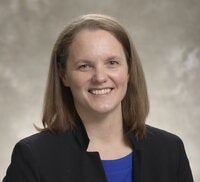
Congratulations to Professor Catherine Christian-Hinman, who was selected to receive the 2023 University of Virginia School of Medicine Distinguished Achievement Award in Biomedical Sciences. The award recognizes exceptional research and professional accomplishments, outstanding discovery and innovation, and exemplary leadership.
Christian-Hinman, who received her PhD from the University of Virginia, joined the University of Illinois Urbana-Champaign faculty in 2014 as an assistant professor in the Department of Molecular & Integrative Physiology after completing postdoctoral training at Stanford University School of Medicine.
At Illinois, she established a research program that investigates the neurobiological links between epilepsy and reproductive endocrine dysfunction, an area of epilepsy research for which there was strong clinical evidence, but mechanistic basic science studies were lacking, she said.
“I saw that I could bring the training I had obtained as a graduate student at UVA, where I studied how the brain controls ovulation, to the epilepsy field to tackle this problem in a new way. I’m extremely gratified that my laboratory has been able to make significant inroads in this area,” Christian-Hinman said.
Thus far, the lab’s research advances have included the first direct recordings of hypothalamic neurons controlling reproduction and the first studies examining pituitary gonadotrope function and hormone release in an animal model of epilepsy.
“We have found many changes that are sex-specific and change dynamically with the estrous cycle in female mice. I’m particularly excited about how our research highlights the value of examining both male and female animals, given that for decades epilepsy research was very heavily skewed towards males,” she said.
Ongoing projects are focused on determining the cellular and circuit mechanisms underlying changes in hypothalamic function with epilepsy and defining the downstream impacts of epilepsy on the pituitary gland, and on determining the roles of brain-derived estrogens in promoting seizure activity and hyperexcitability in epilepsy and Alzheimer’s disease.
Christian-Hinman teaches MCB 401: Cellular Physiology, a course for senior undergraduate and graduate students.
“What I enjoy the most about teaching the class is being able to show how fundamental concepts in cellular physiology are relevant to ongoing investigation and debate in scientific research. What can seem like a very dry topic in the textbook actually turns out to be key to understanding physiological changes over development or in disease states.
“For example, the Nernst equation on its own just looks like a math equation, but in learning how to apply it in physiology, we can predict the direction of movement of a type of ion across a membrane, which influences the response to drugs that modify the membrane proteins that allow for that ion movement, which then determines whether the effect of that drug will be beneficial and therapeutic, or a harmful side effect,” she said.
Christian-Hinman is also Director of Graduate Studies in the Department of Molecular & Integrative Physiology, a faculty affiliate at the Beckman Institute for Advanced Science and Technology, and faculty member of the Neuroscience Program.
A few representative papers from the Christian-Hinman Lab:
- Female-specific pituitary gonadotrope dysregulation in mice with chronic focal epilepsy
- Increased GABA transmission to GnRH neurons after intrahippocampal kainic acid injection in mice is sex-specific and associated with estrous cycle disruption
- Dynamic and Sex-Specific Changes in Gonadotropin-Releasing Hormone Neuron Activity and Excitability in a Mouse Model of Temporal Lobe Epilepsy
